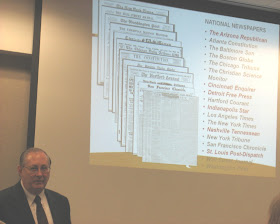The third presentation at the
American Library Association (ALA)
Reference and User Services Association (RUSA)
History Section's genealogy preconference at the
Midwinter Meeting in Dallas on January 20 was by
William Forsyth of
Proquest on their
genealogy/history database products for libraries. Proquest sponsored this free preconference and provided yummy breakfast goodies and a delicious lunch.
Thanks to the
TexShare Database Program, over 700 libraries in Texas have access to Proquest's
Heritage Quest Online database, and to Texas maps in the
Digital Sanborn Maps collection. A number of larger public library systems have access to all the maps in the latter collection (as do some universities), as well as to the
Ancestry Library Edition (
NOT the same as Ancestry.com).
Heritage Quest has some
unique content that's not in either Ancestry. Its Genealogy and Local History Book Collection has over 24,000 family histories, local histories, and primary sources. Because the database will mark "hits" in the book of your search terms, you can quickly scan though your results.
Many academic libraries (and some larger public libraries) subscribe to at least one title in
Proquest Historical Newspapers. My university subscribes only to
The New York Times, 1851-2007, but I have used it often in genealogical research. I was pleased to see that ProQuest has a clean new user interface, AND a new way to search obituaries and death notices directly.
It was interesting to hear about a couple genealogy products I was not aware of.
ProQuest Sanborn Maps Geo Edition has geocoded Sanborn maps (1867-1970) that are searchable by address and GPS coordinates. You can also overlay Sanborn maps with current maps (street, satellite, and hybrid layers) to see how an area has changed. Currently, though, this is only available for certain cities in certain states, and Texas is not one of them.
Another new product to me was
Historic Maps Works Library Edition, which is an exclusive distribution and development partnership between ProQuest and
Historic Map Works. The latter is a company that scans and uploads old maps and geocodes them to modern maps. This allows users to search by modern day address or GPS coordinates (currently only available for 12 states, mostly in the northeast, via ProQuest). Users can also search by keywords, town names, map publishers, or year; or browse by geographic location through a point-and-click world map.
Below is an example (from the Historic Map Works site) of an Abilene 1885 Sanborn map (in color) overlayed onto a Google Map from today (on the left), and an enlargement of one city block overlayed onto a Google Hybrid (satellite and map, on the right):


Forsyth demonstrated the use of some of these products with an interesting case study of his own: his great-grandfather,
Ellend Erickson, a Norwegian immigrant who
served in the Union Army during the Civil War and was later elected to the
Minnesota State Legislature. The handout we got on Proquest is
here.
© Amanda Pape - 2012 -
click here to e-mail me.












